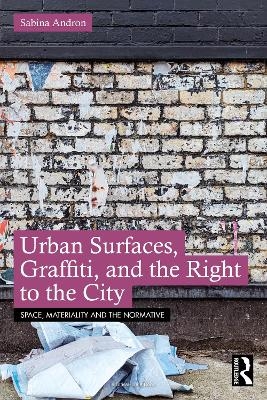
Urban Surfaces, Graffiti, and the Right to the City
Routledge (Verlag)
978-1-032-59751-5 (ISBN)
This landmark book focuses on urban surfaces, on exploring their authorship and management, and on their role in struggles for the right to the city.
Graffiti, pristine walls, advertising posters, and municipal signage all compete on city surfaces to establish and imprint their values on our environments. It is the first time that the surfacescapes of our cities are granted the entire attention of a book as material, visual, and legal territories. The book includes a critical history of graffiti and street art as contested surface discourses and argues for surfaces as sites of resistance against private property, neoliberal creativity, and the imposition of urban order. It also proposes a seven-point manual for a semiotics of urban surfaces, laying the ground for a new discipline: surface studies.
Page after page and layer after layer, surfaces become porous and political and emerge as key spatial conditions for rethinking and re-practicing urban dwelling and spatial justice. They become what the author terms the surface commons.
The book will appeal to a wide readership across the disciplines of urban studies, architectural theory and design, graffiti, street art and public art, criminology, semiotics, visual culture, and urban and legal geography. It will also serve as a tool for city scholars, policy makers, artists, and vandals to disrupt existing imaginaries of order, justice, and visibility in cities.
Sabina Andron is Postdoctoral Fellow in Cities and Urbanism at the University of Melbourne, Australia.
Introduction: the city of surfaces 1
1 Surface semiotics: a manual for knowing surfaces 9
1. The places of discourse are fundamental to the production of meaning 10
2. Signification takes place in localised aggregates 14
3. Surfaces are thick and alive 20
4. Dirt is a crime 24
5. Order is white 29
6. Visibility generates value 33
7. Text makes space, and the city makes us literate 38
8. Surface betrayals and restitutions 42
9. Conclusion, or six proposals for the significance of signs and surfaces 45
10. Wall interview 48
2 Beyond art and crime: a critical history of graffiti and street art 58
1. Wall writing is a time portal 59
2. Graffiti is only a name 63
3. Every tag is collectively authored 65
4. The writing is not on the wall 69
5. Fear is a self-fulfilling prophecy 72
6. Gallery walls redeem urban walls 78
7. Street art is a different name 82
8. The image is not on the wall 85
9. Authoritarianism comes in beautiful colours 90
10. Urban creativity is a well-oiled machine 96
11. Street art sold my city 101
Conclusion, or six proposals against institutional appropriations 105
3 Law and graffiti: property, crime, and the surface commons 116
1. Law is everywhere; everywhere is law 117
2. Surfaces complicate property regimes 122
3. The right to the city is the right to the surface 126
4. Writing on walls has a long history of regulation 130
5. Graffiti offends against property and order 133
6. Offence is an ambiguous affair 138
7. The majority decides what is proper 141
8. The argument against art 147
Conclusion, or five proposals for a surface commons 149
4 Leake Street London: legal walls and deep surfaces 159
1. Ownership is tedious 161
2. Street art is just the beginning 163
3. Not all legal walls are created equal 166
4. Graffiti knows no boundaries 168
5. 100 Days of Leake Street is not enough 172
6. Tagging is pro-social 174
7. Eat drink shop graffiti 180
Conclusion, or five proposals for learning from Leake Street 186
Conclusion: cultural heritage and the right to the surface city 190
The right to the city is the right to the surface: a manifesto 197
Acknowledgements 199
Index 201
| Erscheinungsdatum | 24.11.2023 |
|---|---|
| Reihe/Serie | Space, Materiality and the Normative |
| Zusatzinfo | 53 Halftones, color; 53 Illustrations, color |
| Verlagsort | London |
| Sprache | englisch |
| Maße | 156 x 234 mm |
| Gewicht | 390 g |
| Themenwelt | Kunst / Musik / Theater |
| Naturwissenschaften ► Biologie ► Ökologie / Naturschutz | |
| Recht / Steuern ► EU / Internationales Recht | |
| Recht / Steuern ► Öffentliches Recht ► Umweltrecht | |
| Recht / Steuern ► Strafrecht ► Kriminologie | |
| Technik ► Architektur | |
| ISBN-10 | 1-032-59751-8 / 1032597518 |
| ISBN-13 | 978-1-032-59751-5 / 9781032597515 |
| Zustand | Neuware |
| Haben Sie eine Frage zum Produkt? |
aus dem Bereich


